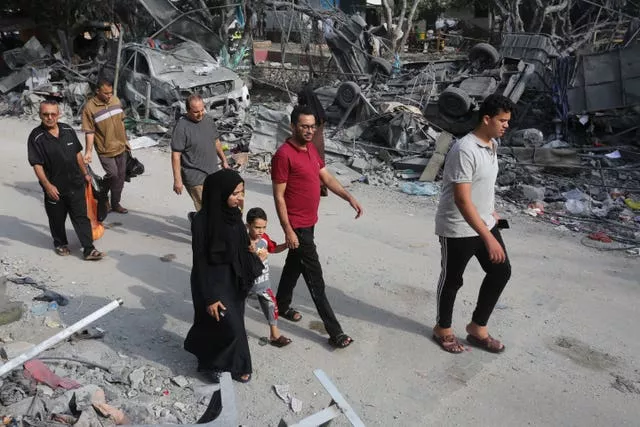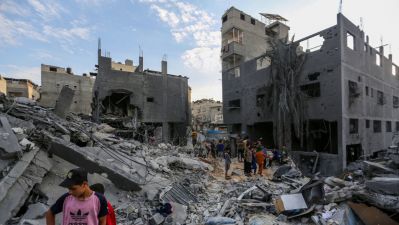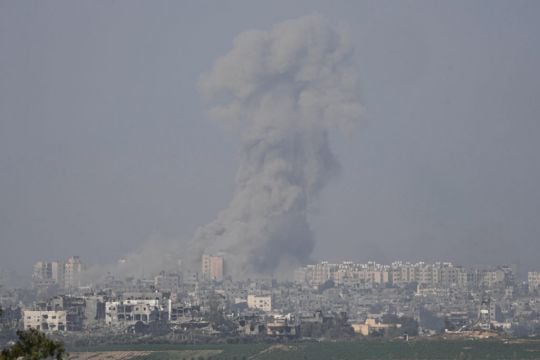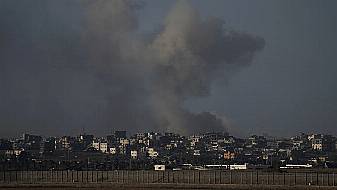Israel is expanding its ground operation in Gaza, with infantry and armoured vehicles backed by “massive” strikes from the air and sea, a military spokesman has said.
Rear Admiral Daniel Hagari said on Saturday that “the forces are still on the ground and are continuing the war”.
Earlier on Saturday, the military had released videos showing columns of armoured vehicles moving slowly in open sandy areas of Gaza, the first visual confirmation of ground troops.
Previously, troops had conducted brief nightly ground incursions before returning to Israel.

The move is a further escalation in Israel’s campaign to crush the territory’s ruling militant group Hamas after its bloody incursion in southern Israel three weeks ago and a new sign that Israel is moving closer to an all-out invasion of Gaza.
Late on Friday, Mr Hagari had said ground forces were “expanding their activity” in Gaza and “acting with great force to achieve the objectives of the war”.
The Hamas-run health ministry in Gaza said 377 people have been killed since Israel expanded its large ground offensive on Friday evening.
Israel has amassed hundreds of thousands of troops along the border.
Overnight into Saturday, warplanes struck 150 tunnels and underground bunkers in northern Gaza, the military said.
Hamas’s extensive underground installations, many of them located under Gaza City in the north of the territory, are seen as key targets of the offensive.
As part of the stepped-up bombardment, Israel also knocked out communications and created a near-blackout of information, largely cutting off the 2.3 million people in besieged Gaza from contact with the outside world.
Already plunged into darkness after most electricity was cut off weeks ago, Palestinians were thrown into isolation, huddling in homes and shelters with food and water supplies running out.

Attempts to reach Gaza residents by phone were largely unsuccessful early on Saturday.
Explosions from continuous airstrikes lit up the sky over Gaza City for hours after nightfall on Friday.
Palestinian telecom provider Paltel said the bombardment caused “complete disruption” of internet, cellular and landline services.
The cut-off meant that casualties from strikes and details of ground incursions could not immediately be known. Some satellite phones continued to function.
Relatives outside Gaza panicked after their messaging chats with families inside suddenly went dead and calls stopped going through.
Wafaa Abdul Rahman, director of a feminist organisation based in the West Bank city of Ramallah, said she had not heard for hours from family in central Gaza.
She said: “We’ve been seeing these horrible things and massacres when it’s live on TV, so now what will happen when there’s a total blackout?”

Israel says its strikes target Hamas fighters and infrastructure, and that the militants operate from among civilians, putting them in danger.
The Hamas media centre reported heavy night-time clashes with Israeli forces at several places, including what it said was an Israeli incursion east of the refugee camp of Bureij in the central Gaza Strip.
Asked about the report, the Israeli military reiterated early on Saturday that it had been carrying out targeted raids and expanding strikes with the aim of “preparing the ground for future stages of the operation”.
Hamas said in a statement on Saturday that its military arm, Qassam Brigades, used anti-tank Kornet rockets and mortar shelling to repel the attack and claimed its fighters inflicted casualties among Israeli troops. The militant group did not provide evidence.
The Palestinian death toll in Gaza has soared past 7,700, more than 60 per cent of them minors and women, according to the territory’s health ministry.
A blockade on Gaza has meant dwindling supplies and the UN warned that its aid operation helping hundreds of thousands of people was “crumbling” amid near-depleted fuel.
More than 1,400 people were killed in Israel during Hamas’s October 7 attack, according to the Israeli government, and at least 229 hostages were taken into Gaza.
Among those killed were at least 310 soldiers, according to the military.
The families of hostages held in Gaza by Hamas warned they will begin protesting if Israel prime minister Benjamin Netanyahu and defence minister Yoav Gallant do not meet them on Saturday.
The families said they want the meeting because of increased apprehension about their loved ones after Israel ramped up attacks on Gaza overnight.

The military’s claim it is targeting tunnel infrastructure has prompted fear among the families that military leaders are being cavalier with the lives of the hostages, who are believed to be held inside the tunnels.
“The families that are here are deeply concerned about their families and their loved ones,” said Miki Haimovitz, a former politician acting as a group spokesperson.
“They feel like they’re they’re left behind and no one is really caring about them. No one is talking to them. No one is explaining what’s going on.”







